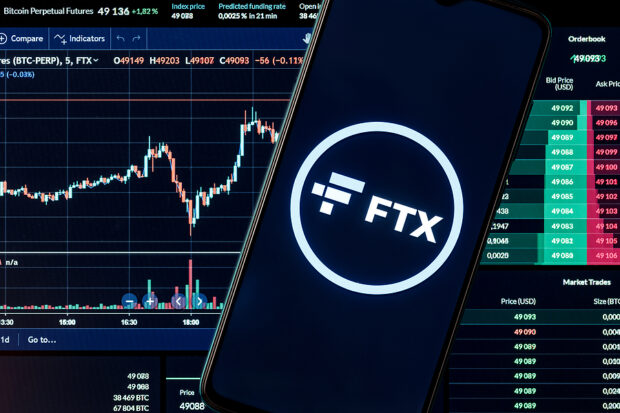The collapse of the cryptocurrency exchange FTX demonstrates the dangers of failures of corporate governance, according to a commentary published by AM Best.
While FTX is not an insurance company, the series of events leading to its collapse should provide “a sobering warning” for the insurance industry about governance, financial reporting and regulation, said the report titled “Corporate Governance Lessons for Insurers in the Wake of the Failure of FTX.”
Addressing the governance issue, the commentary said, FTX surprisingly did not have a board of directors.
“An experienced, informed and independent board is vital for effective governance practices, to ensure insurance companies are run and challenged in an appropriate way,” said Michael Dunckley, director, analytics, AM Best, in a statement accompanying the report.
“As part of its ratings process, AM Best seeks to assess the substance of an insurer’s governance, as well as its stated policies. The board should be able to effectively hold senior management to account and ensure that stakeholders’ interests are protected,” he added.
To achieve this, the report said, the board must provide a combination of relevant knowledge and experience with a sufficient level of independence.
“In order to promote effective oversight of executives, many jurisdictions do not allow a combined CEO-chair role. In markets where it is permitted, such as France and the US, pressure from regulators and investors is increasingly pushing insurance companies to split the function,” the report continued.
AM Best noted that the European Insurance and Occupational Pensions Authority (EIOPA) ranks “internal governance and control risk,” along with “management and staff competence risk” as the leading causes of failures and near misses for insurance companies.
AM Best agreed by saying that effective governance is an important indicator of financial strength long before environmental, social and governance (ESG) criteria became a widespread concept. “Good governance promotes long-term value creation and financial stability, while bad governance risks destroying value,” the commentary said.
The ratings agency said it typically takes a favorable view of insurance company enterprise risk management (ERM) frameworks which incorporate lessons learned from recent events and emerging issues. “Equally, we expect insurers with strong governance practices to be better able to manage risks.”
AM Best addressed some of the red flags that existed before the FTX collapse, which the insurance industry should avoid.
Dangers of Rapid growth
FTX’s revenue grew massively – by more than 1,000% during 2021, said AM Best.
Although high premium growth may not always be a danger sign for insurers, AM Best said, “rapid growth can be an indication that an insurance company has underpriced business to gain market share or has expanded into an unfamiliar product line – both of which may lead to underwriting losses. Such high growth can be a result of poor strategic decisions associated with weak corporate governance.”
Dangers of Single Decision Maker

FTX suffered from a concentration of power in the hands of a single individual (founder and CEO Sam Bankman-Fried), combined with a lack of experience among its senior management team, the commentary explained. “Strength and depth of management teams are essential for an insurance company to successfully execute its strategy. Conversely, a lack of accountability of executives or too much power held by a single individual may lead to poor management decision-making.”
A strong risk-aware culture is based on a common understanding of risk in a management team, which enables valuable collaboration, AM Best said, noting that an effective risk function within an insurance company typically should be independent, and report directly to the board risk committee.
“This would promote stronger understanding of the company’s risk profile and enhance the ability of the board of directors to have strong oversight.”
Failures of Financial Reporting
AM quoted John Ray III, the new CEO appointed to oversee the liquidation of FTX, Lwho said: “Never in my career have I seen such a complete failure of corporate controls and such a complete absence of trustworthy financial information as occurred here.”
“Management teams with insufficient access to timely financial information lack the ability to make accurate strategic decisions, while insurance companies with poor data quality have weaker pricing capability and are at a competitive disadvantage,” the commentary continued.
High quality, independent financial reports provide stakeholders with a clear view of an insurance company’s financial position, allowing them to hold management teams to account, it said.
“Conversely, a lack of transparency with external parties in terms of financial reporting or making misleading public statements is powerful indicator of poor corporate governance and can precede a substantial decline in a company’s financial strength,” the AM Best commentary said.
“Concerning signs include an inability to produce an unqualified audit, re-statements or delays in filing. In particular, restatements associated with reserve strengthening can indicate poor pricing in the past, inadequate actuarial review or manipulation of reserves to improve profitability.”
Importance of Effective Regulation
AM Best noted that the Bahamas’ regulatory regime (where FTX was domiciled) has been under “considerable scrutiny” in the wake of the FTX scandal. “We believe that well-developed and effective regulatory regimes have a strong focus on effective corporate governance.”
On a positive note, AM Best said that many jurisdictions globally are including enhanced scrutiny of governance as part of regime enhancement… “While the board of directors protects the interests of investors, the prudential and conduct regulatory regime should act as an effective oversight for all stakeholders including policyholders.”
Photograph: In this photo illustration the FTX logo and mobile app adverts are displayed on screens on Nov. 10, 2022 in London, England. Photo credit: Leon Neal/Getty Images Europe





















 AI Got Beat by Traditional Models in Forecasting NYC’s Blizzard
AI Got Beat by Traditional Models in Forecasting NYC’s Blizzard  NYC to Install Red Light Cameras at 600 Intersections by Year End
NYC to Install Red Light Cameras at 600 Intersections by Year End  Beyond Automation: The Emerging Role for Contextual AI in Insurance
Beyond Automation: The Emerging Role for Contextual AI in Insurance  State Farm Mutual to Pay $5B Dividend to Auto Insurance Customers
State Farm Mutual to Pay $5B Dividend to Auto Insurance Customers 




